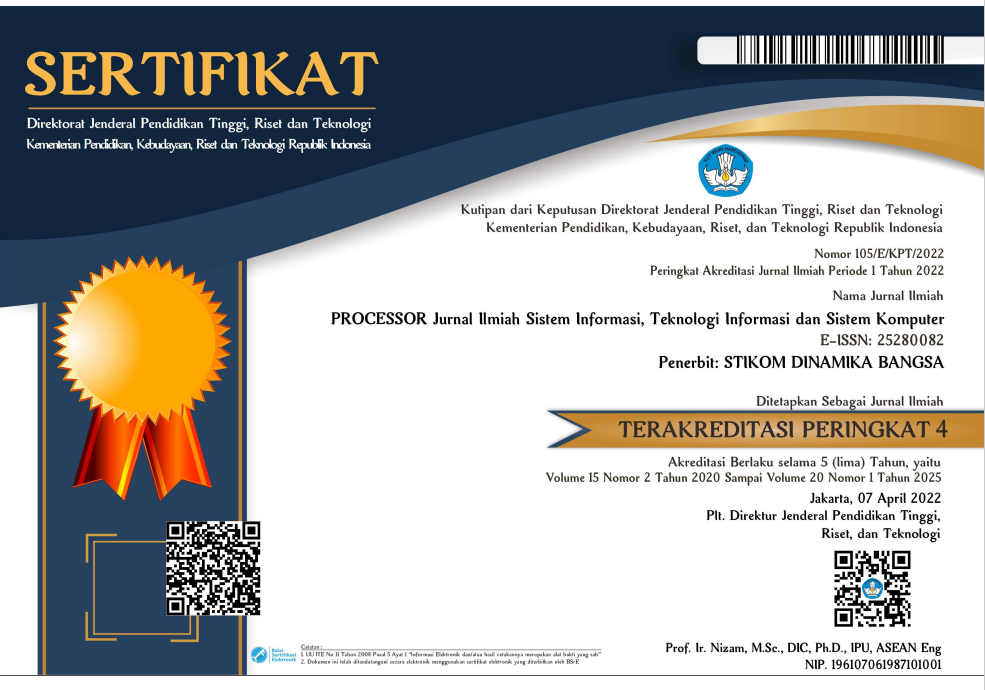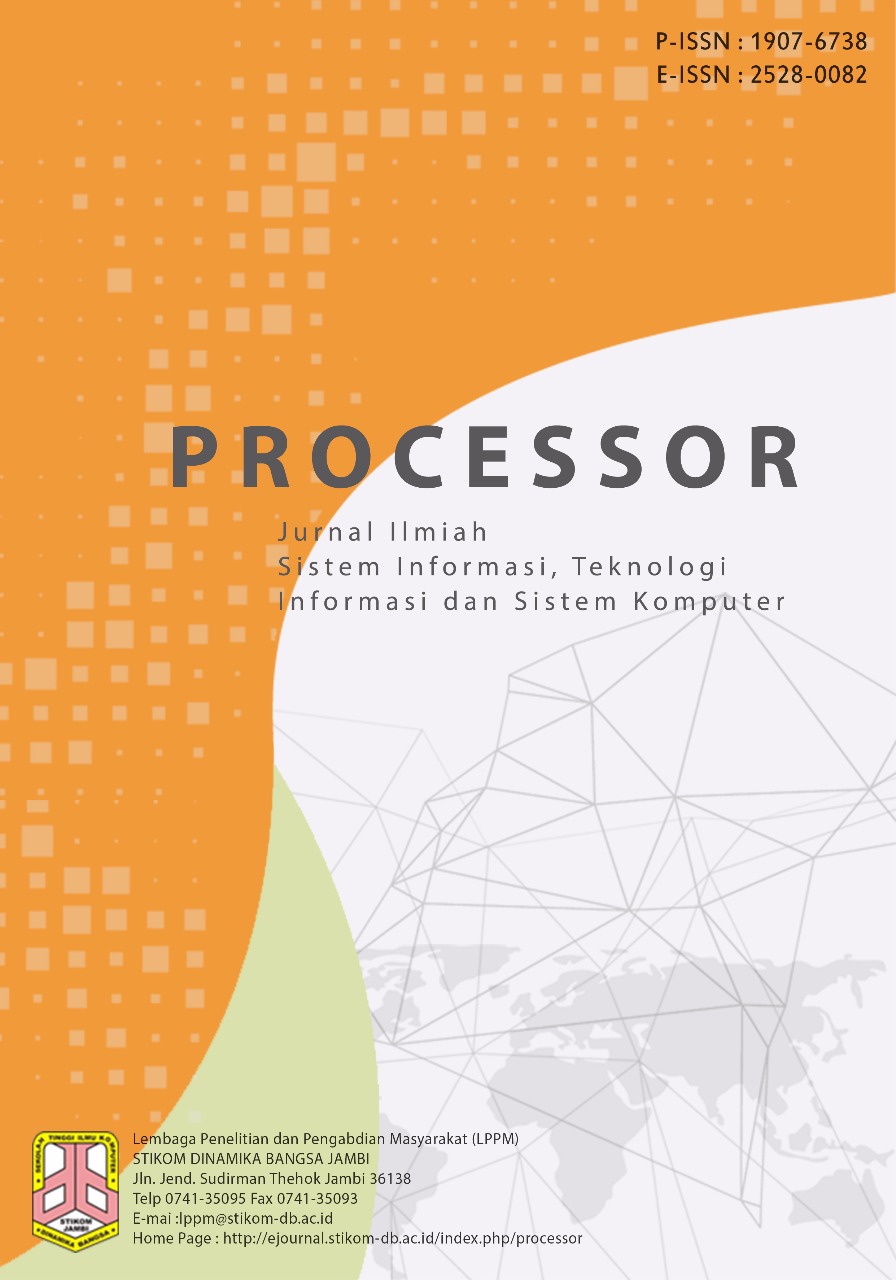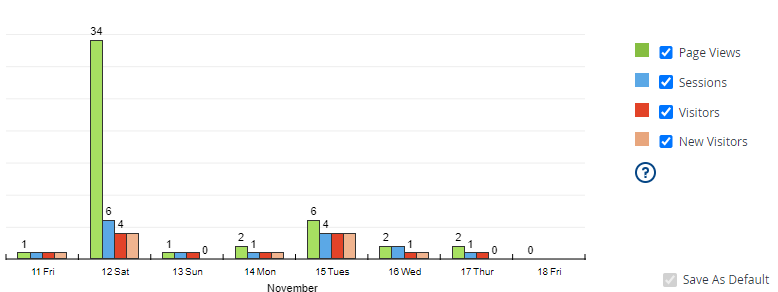IoT-Based Infusion Monitoring System with Real-Time Notifications via Telegram
DOI:
https://doi.org/10.33998/processor.2024.19.2.1843Abstract
Infusions are clinical equipment for administering liquid medication or nutrients to patients. Infusion fluid is stored in a sterile bag and delivered to a vein through a tube. Infusion monitoring is usually done manually by nurses, which often results in negligence such as replacing the liquid run out too late, handling infusions that are not dripping, and dealing with blood that rises into the infusion hose. Therefore, a real-time monitoring system is needed that can provide information and remote notifications about the condition of the infusion. This research develops an IoT-based system using NodeMCU ESP32, Loadcell sensor, TCRT5000 sensor, LDR sensor, Node-RED, and Telegram bot application. NodeMCU ESP32 serves as the main controller. Loadcell sensor gauges volume of the infusion fluid, TCRT5000 sensor counts droplets per minute, and LDR sensor detects blood in the infusion hose. Sensor data is sent to Node-RED for processing and display on the Telegram bot application. The accuracy of the Loadcell sensor reaches 95.69%, while the TCRT5000 sensor has an accuracy of 76.73%. Notifications are sent when the infusion fluid volume is less than 100 ml, the infusion fluid is not dripping, and when the LDR sensor detects blood in the infusion hose.
Downloads
References
G. Priyandoko, D. Siswanto, dan I. I. Kurniawan, “Rancang Bangun Sistem Portable Monitoring Infus Berbasis
Internet of Things,” Jambura Journal of Electrical and Electronics Engineering, vol. 3, no. 2, Jul 2021.
M. D. C. Pane, “Jenis Cairan Infus dan Kegunaannya,” ALODOKTER.
R. Sulaiman, Z. Azhar, dan T. Christy, “Perancangan Sistem Alat Pemantauan Cairan Infus Pada Klinik Utama
Tanjung Balai Berbasis Nodemcu,” JUTSI (Jurnal Teknologi dan Sistem Informasi), vol. 1, no. 3, hlm. 211–218, Okt
, doi: 10.33330/jutsi.v1i3.1310.
M. H. Ulfa, S. Purwanto, dan Hikayati, “Prototype Sederhana Alat Monitoring Aliran Darah Naik ke Selang Infus,”
Jan 2019.
R. Fadli, “Berbahayakah Darah Naik ke Selang Infus Tangan?,” halodoc.
K. A. R. Gunawan, N. P. R. Artini, dan GT. N. B. G. K. Aditya, “Rancang Bangun Alat Pemantauan Infus Berbasis
Arduino Dengan Pendeteksian Berat Infus, Jumlah Tetesan dan Penanda Darah Naik Pada Selang Infus,” E-Jurnal
Widya Kesehatan, vol. 4 no.2, Okt 2022.
M. F. Syauqi, Japeri, M. Zaini, dan Nurachman, “Implementasi Microcontroller Arduino Dalam Rancang Bangun
Pendeteksi Naiknya Darah Pada Selang Infus,” Jan 2022.
Y. R. Putung, D. Noya, V. F. Aror, J. Sundah, dan M. Dg Patabo, “Rancang Bangun Monitoring Cairan Infus Dengan
Arduino Nano Berbasis Android,” Jambura Journal of Electrical and Electronics Engineering, vol. 5, no. 1, 2023.
L. Nurfitria, S. Sambasri, S. U. Prini, dan P. Korespondensi, “Sistem Alarm Penggantian Cairan Infus Berbasis
Mikrokontroler Menggunakan Wireless,” Jurnal Teknologi Informasi dan Ilmu Komputer (JTIIK), vol. 7, no. 3, hlm.
–470, 2020, doi: 10.25126/jtiik.202071837.
R. Maharani, A. Muid, dan U. Ristian, “Sistem Monitoring dan Peringatan pada Volume Cairan Intravena (Infus)
Pasien Menggunakan Arduino Berbasis Website,” Coding: Jurnal Komputer dan Aplikasi, vol. Volume 07, No. 03,
hlm. 97–108, 2019.
M. S. R. Maulana, T. Rohana, dan T. Al Mudzakir, “Implementasi Fuzzy Logic Dalam Monitoring Infus Berbasis
Internet of Things (IoT),” Jurnal Sains Komputer & Informatika (J-SAKTI, vol. 7, no. 2, hlm. 957–967, 2023.
S. A. Kadiran, E. Supriyanto, dan M. Y. Maghribi, “Sistem Monitoring dan Controlling Cairan Infus Berbasis
Website,” JURNAL RISET REKAYASA ELEKTRO, vol. 5, no. 1, hlm. 57–64, 2023.
P. A. Rosyady dkk., “Monitoring Cairan Infus Menggunakan Load Cell Berbasis Internet of Things (IoT),” Jurnal
Ilmiah Elektroteknika, vol. Vol. 22 No. 1, hlm. 97–110, Apr 2023.
M. Yusup, P. Abas Sunarya, dan K. Aprilyanto, “Rancang Bangun Sistem Monitoring Pengukuran Volume Air
Berbasis IoT Menggunakan Arduino Wemos,” CERITA, vol. 6 no. 2, hlm. 147–153, 2020.
C. F. Naa, “Greenhouse Monitoring System using ESP32, Raspberry Pi, MQTT and Node-RED,” Jurnal Teknik
Elektro dan Komputer, vol. 11, no. 3, hlm. 133–138, 2022.
H. A. Setiawan dan T. Rijanto, “Rancang Bangun Sistem Kontrol Pengisian Air Minum dalam Kemasan
Menggunakan Arduino Uno dengan Sensor Load Cell,” Jurnal Teknik Elektro, vol. 08 Nomor 03, hlm. 579–584, 2019.
T. Akbar dan I. Gunawan, “Prototype Sistem Monitoring Infus Berbasis IoT (Internet of Things),” Edumatic: Jurnal
Pendidikan Informatika, vol. 4, no. 2, hlm. 155–163, Des 2020, doi: 10.29408/edumatic.v4i2.2686.
T. D. Hendrawati dan R. A. Ruswandi, “Sistem pemantauan tetesan cairan infus berbasis Internet of Things,” JITEL,
vol. 1, no. 1, hlm. 25–32, 2021.
N. Alamsyah, H. F. Rahmani, dan Yeni, “Lampu Otomatis Menggunakan Sensor Cahaya Berbasis Arduino Uno
dengan Alat Sensor LDR,” Formosa Journal of Applied Sciences, vol. 1, no. 5, hlm. 703–712, Okt 2022, doi:
55927/fjas.v1i5.1444.
S. Mulyono, M. Qomaruddin, dan M. Syaiful Anwar, “Penggunaan Node-RED pada Sistem Monitoring dan Kontrol
Green House berbasis Protokol MQTT,” Jurnal Transistor Elektro dan Informatika (TRANSISTOR EI, vol. 3, no. 1,
hlm. 31–44, 2018.
V. Reinard, H. Hugeng, dan H. S. Utama, “Perancangan Sistem Pemantauan Sensor pada Programmable Logic
Controller Mesin Produksi Berbasis Internet of Things,” Jurnal INTRO, vol. 2, no. 2, 2023
A. L. Sari, E. L. Maulidina, dan Noprianto, “ALAT PENDETEKSI KEBOCORAN GAS LPG DENGAN
MEMANFAATKAN TELEGRAM BOT SEBAGAI MEDIA INFORMASI LPG GAS LEAKAGE DETECTOR BY
UTILIZING BOT TELEGRAM AS INFORMATION,” Jurnal Sistem Informasi Dan Bisnis Cerdas, vol. 15, no. 2,
A. Sanaris dan I. Suharjo, “Prototype Alat Kendali Otomatis Penjemur Pakaian Menggunakan NodeMCU ESP32 Dan
Telegram Bot Berbasis Internet of Things (IOT),” Gejayan, 2020.























